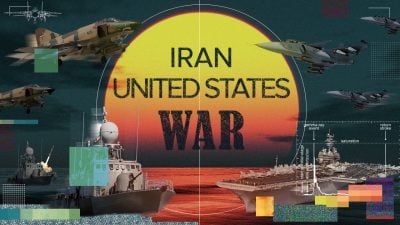Is Joe Biden Preparing for War against Iran? Will Russia and China Intervene?

All Global Research articles can be read in 27 languages by activating the “Translate Website” drop down menu on the top banner of our home page (Desktop version).
***
As the US led aggression against Iran escalates, Russia and China stand closer with Iran. Recent reports of joint naval drills planned with Iran, Russia and China in the Indian Ocean and Gulf of Oman will send a clear message to the new US leadership. Whatever President Joe Biden and his administration are preparing for Iran, they will need to factor in Russia and China.
Biden is demanding Iran scale back its nuclear programme before the US considers re-joining the Joint Comprehensive Plan of Action (JCPOA), commonly known as the ‘Iran Nuclear Deal’ – and before the vindictive and ruthless US led sanctions against Iran are lifted.
In January 2021, ‘Al Jazeera’ reported that the US national security adviser, Jake Sullivan, had emphasised Iran is a key priority for the new administration. “From our perspective, a critical early priority has to be to deal with what is an escalating nuclear crisis as they (Iran) move closer and closer to having enough fissile material for a weapon.” Earlier, Biden’s new secretary of state, Tony Blinken, insisted Tehran must resume complying with the Iran nuclear deal before Washington would do so. Blinken said, “that if Iran comes back into full compliance with its obligations under the JCPOA, the United States would do the same thing”. At a press conference in Istanbul, Iran’s, Foreign Minister Mohammad Javad Zarif, responded that Tehran would not accept the unreasonable US demands.
In 2018, President Donald Trump had pulled the US out of the ‘Iran Nuclear Deal’ and imposed stricter sanctions on Iran. The sanctions aim to crush Iran’s economy – and the US threatens secondary sanctions against any other country doing business with Iran. Russia and China have repeatedly spoken out against Trump’s withdrawal from the deal and have urged Biden to recommit to it with no conditions – and continue to bypass the sanctions.
The ‘Iran Nuclear Deal’ was adopted under the Obama administration in 2015 – and agreed between Iran and the permanent members of the United Nations Security Council —the United States, the United Kingdom, Russia, France, and China—plus Germany and the European Union. The deal was codified into a UN resolution. It requires Iran to dismantle nearly all of its nuclear infrastructure – and in exchange economic sanctions against Iran would be lifted.
Apart from the US, other signatory nations have remained fully committed to the ‘Iran Nuclear Deal’, even though the Iranian leadership has repeatedly criticised the Europeans for failing to live up to their commitments for fear of American sanctions.
As well as imposing sanctions, the US and its allies have orchestrated further acts of provocation with the murder of Iranian military and civilian personnel. In January 2020, President Donald Trump ordered the killing of Maj. Gen. Qassem Soleimani by a US airstrike at Baghdad International Airport.
In November 2020, Iran’s top nuclear scientist, Mohsen Fakhrizadeh, was assassinated. The United Nation Special Rapporteur, Agnes Callamard, called the assassination an act in violation of international human rights law and the UN charter which prohibits use of force extraterritorially. According to reports at the time, the former head of the US CIA, John Brennan, argued the killing of the scientist was a “criminal” and “highly reckless” act that risks inflaming conflict in the region. On 11 February 2021, ‘The Times’ reported Israel was involved with his murder.
Although Russia and China may have responded to the murders in a muted tone, demanding “restraint” from all sides to avoid escalating tensions, both nations continue to support Iran in other ways.
In December 2020, the Russian Foreign Minister Sergei Lavrov, remained defiant, asserting, “We do not just refuse to recognise unilateral sanctions, but support Iran with specific measures”, adding, “we will be looking for new methods of ignoring the sanctions’ negative economic effect.”
The Chinese initiated ‘Iran-China Comprehensive Strategic Partnership’, which includes a potential investment of $400billion over a 25-year period, ensures China’s commitment to Iran in both military and economic terms.
Russia and China view the decline of Western economic hegemony as an opportunity to expand their own ambitions – and involving Iran in their immediate and long-term plans is essential to their growth and rise. As well as securing access to Iran’s resources, oil and natural gas, Iran acts as a gatekeeper to the Middle East – and closer ties with Iran would give Russia and China a strategic geopolitical advantage over the US and its allies in the region – and the sanctions will have forced Iran to deepen ties with those two powers.
In December 2019, Russia, China and Iran held their first trilateral naval exercise, ‘Marine Security Belt’, in the Indian Ocean and the Gulf of Oman. The latest proposed joint naval exercise will reinforce the intended message – Russia and China are in solidarity with Iran.
The growing partnership between the three nations will not only force the new US administration and its allies to rethink their predatory policies towards Iran, but it will also shape and affect their future in the Middle East and the wider global stage.
*
Note to readers: please click the share buttons above or below. Forward this article to your email lists. Crosspost on your blog site, internet forums. etc.
Shahbazz Afzal is an independent writer and political activist.
The Globalization of War: America’s “Long War” against Humanity
Michel Chossudovsky
The “globalization of war” is a hegemonic project. Major military and covert intelligence operations are being undertaken simultaneously in the Middle East, Eastern Europe, sub-Saharan Africa, Central Asia and the Far East. The U.S. military agenda combines both major theater operations as well as covert actions geared towards destabilizing sovereign states.
- ISBN Number: 978-0-9737147-6-0
- Year: 2015
- Pages: 240 Pages
List Price: $22.95


